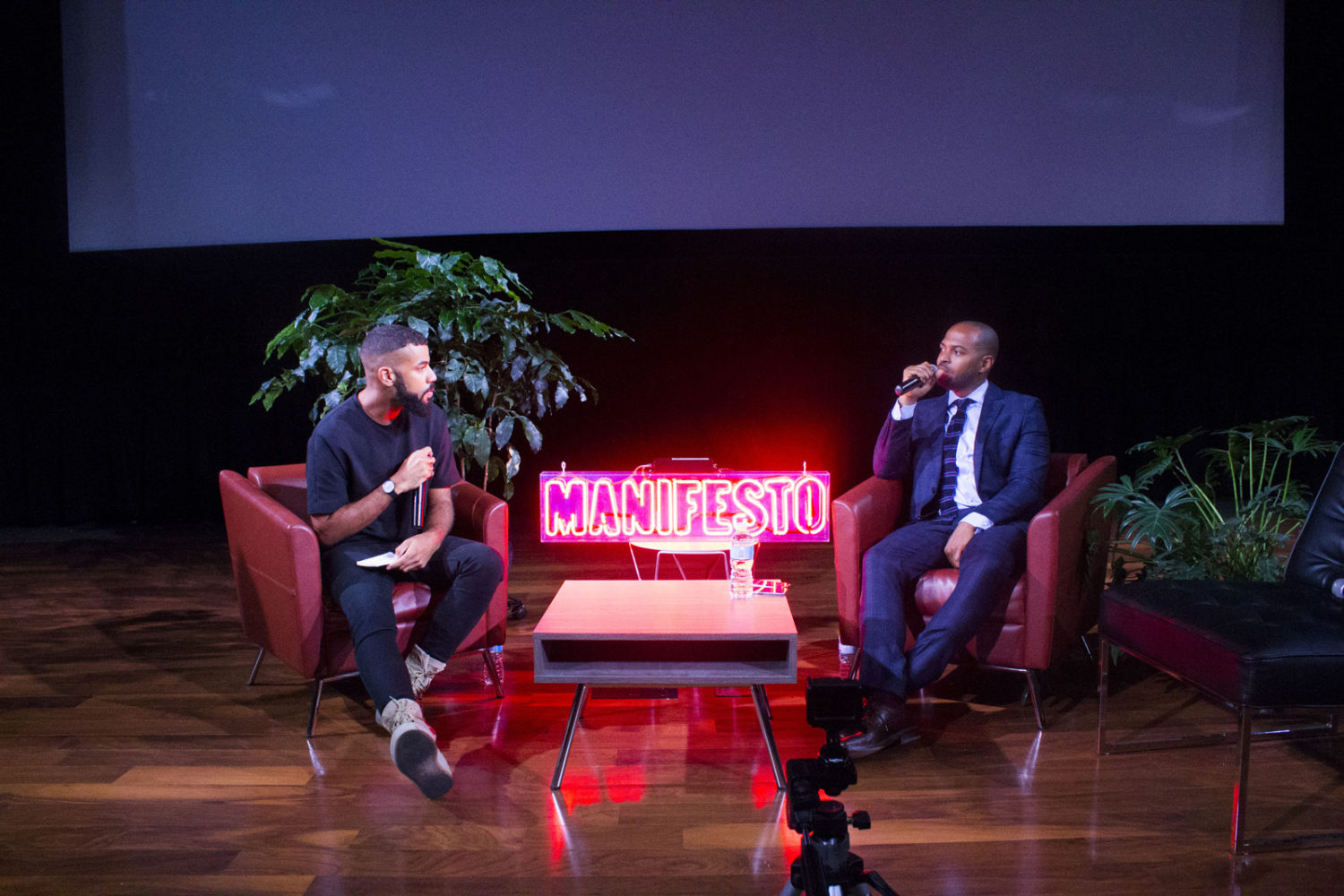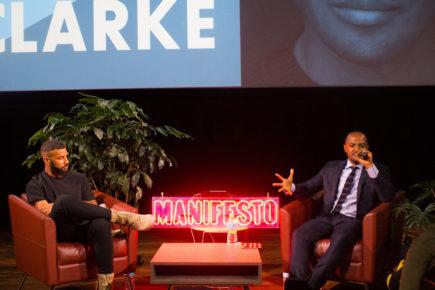For many of us, the last time we saw writer, director and actor Noel Clarke he was garbed in a navy blue hoodie beaten and bloody at the end of AdULTHOOD (2008). The flick, set in West London, follows Clarke’s character Sam Peel through his first 24 hours of freedom after being imprisoned for manslaughter six years earlier. It was the authentic dialogue of the film’s prelude KiDULTHOOD (2006) — slang-ridden, raw and youthful — that originally hooked audiences to the story of Peel and six other teenagers just trying to make it through a day off from school after the suicide of a classmate.
“KiDULTHOOD is based on me and my friends,” says Clarke, whose character Sam is a malicious older bully and the film’s main antagonist. “A lot of the conversations, a lot of the things that happen are just me and my friends growing up on Ladbroke Grove.”
He’s relaxed, seated before an eager audience inside a University of Toronto screening room following the viewing of AdULTHOOD in collaboration with the Manifesto Festival of Community & Culture and the Toronto International Film Festival (TIFF). As he speaks, you’re half expecting him to scowl and ask the crowd ‘Are you dizzy blud?’ or ‘You think you’re a big man?’ as Sam would, but Clarke — dressed in a fitted midnight blue suit, a striped azure tie laying along his chest and patent black dress shoes — has done a lot of growing up since KiDULTHOOD and so has his character.
“That was a difficult film to set up. You would think it would be easy right? Well it wasn’t.”
This past summer Clarke brought his ‘hood’ trilogy to a close with BrOTHERHOOD, in which his character Sam, 10 years after AdULTHOOD (eight years in real time), goes from being a person with nothing to lose to someone who stands to lose everything. It brings to life the story of a man with a rough upbringing trying to better himself for his family, but is put in a situation where he must do everything he can to protect them. Fans of the franchise flooded cinema seats across the UK generating an unforeseen nearly £2 million in ticket sales across 200 screens in its first weekend.
“That was a difficult film to set up,” says Clarke. “You would think it would be easy right? Well it wasn’t.”
KiDULTHOOD itself took nearly five years before the project would be produced and another two for it to grace the screens of local cinemas. Although the film only made a little over a hundred thousand pounds in its first weekend, according to the Internet Movie Database (IMDB), the modest earnings didn’t reflect how much it was being shared through illegal bootlegs and online pirating. The first of the series was to London what Boyz N The Hood was to Los Angeles or what Juice was to Harlem. According to Clarke, the film’s distributer Revolver Entertainment became a factory for vapid flicks with titles like Sket, Offender and Shank that fell under the British urban genre forged by films like KiDULTHOOD and Saul Dibb’s Bullet Boy (2004).
 Following KiDULTHOOD’s success Clarke’s stream of creative conscious cultivated scripts about doctors, lawyers and families with Black leads and complex plotlines that he believed would solidify his claim to the filmmaking ecosystem, but he soon found that the funding just wasn’t there.
Following KiDULTHOOD’s success Clarke’s stream of creative conscious cultivated scripts about doctors, lawyers and families with Black leads and complex plotlines that he believed would solidify his claim to the filmmaking ecosystem, but he soon found that the funding just wasn’t there.
“KiDULTHOOD for [investors] was like ‘alright you surprised us, we weren’t expecting that, but it’s a fluke; those things happen.”
For Clarke it seemed that if the storyline didn’t paint a picture of disorderly urban kids up to their knees in drugs and guns for hands then it wasn’t going to see the light of day. Even getting AdULTHOOD off the ground was a tumultuous feat. Then by 2011 the genre became rot with third-rate imitations and had been exploited to death. The market met its demise and a third movie was almost inconceivable despite the fact that Clarke had created a brand and received the Orange Rising Star Award in 2009 from the British Academy of Television and Arts.
“If [investors] don’t feel the audience is going to watch the movie and they are not going to make enough money, they are not going to make the project.”
It took investor Lionsgate UK recognizing the potential of a third film to finally get the ball rolling. BrOTHERHOOD did exceedingly well at the box office nabbing the number two spot behind Seth Rogan’s Sausage Party that weekend in the UK.
A major criticism for Clarke’s series has been that it’s a reinforcement of social stereotypes and an hour and a half long advertisement for violence and drugs. However, Clarke explains that the trilogy began as a reflection of a class of people that were under represented in UK films at that time. Adding that when he did pen scripts that depicted people of colour in other genres, playing diverse roles, those films were either ignored by investors or ignored by audiences.
“The population of people of colour in London is a lot smaller than it is in America and Canada. If [investors] don’t feel the audience is going to watch the movie and they are not going to make enough money, they are not going to make the project.”
It is Clarke’s hope that BrOTHERHOOD will be able to open the door for new voices to tell their stories and that audiences will turn off their laptops, pull up to a theatre money in hand, and pay to watch projects produced by people of colour. That the inexhaustible range of the multi-ethnic and multi-racial population is represented on the big screen as more than just convenience store owners, illegal immigrants or gangsters.
“These films, they’re big events in the UK,” says actor Arnold Oceng who plays the role of Henry, who is hired to kill Sam in AdULTHOOD. “The cinemas are packed, every seat is full and people are actually having dialogue. When he’s running away from the police people are in there saying ‘Run Sam!’ They’re really getting involved. It shows you how imperative these films are to our culture and to the UK.”
Photos © Anthony Ameyaw + Urbanology Magazine




Comments are closed.